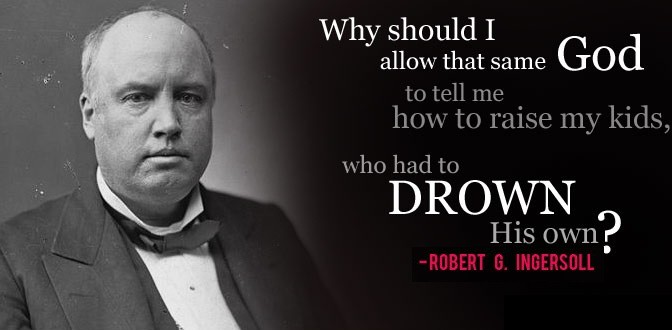Feb 9th is Thomas Paine’s birth anniversary, but today I write about the man who helped to keep Thomas Paine’s memory from fading into historical obscurity; Robert G. Ingersoll.
Born the son of a Congregationalist Preacher in 1833, Robert Ingersoll was an attorney, civil war officer, political leader, writer and speaker. Known as the Great Agnostic, Ingersoll was a leading figure in what was later to be called the Golden Age of Freethought. He openly challenged religious belief at a time when most would never have thought to even question it; much less have the courage to take those challenges into the public arena. He was one of the last great orators; speaking in an age without microphones or electronic amplification, he would hold hundreds spell-bound for hours with his well-reasoned rhetoric.
Ingersoll was instrumental in keeping the secular views of the Founding Fathers from fading into the religious landscape of the 19th century. Wherever he went, he put the lie to preachers from every denomination who proclaimed, as they still do today, that the founding fathers were not only Christian, but most believed the same things that they themselves preached. Ingersoll wrote and spoke often on the subject and frequently referred to Thomas Paine and his work: “The Age of Reason”. Ingersoll almost single-handedly salvaged Paine’s legacy from the ashes of history.
Susan Jacoby wrote in her book “The Great Agnostic” that for Ingersoll “the relative obscurity of Thomas Paine… was nothing less than a crime against the true history of the United States”; saying that Paine’s memory had been intentionally tarnished and discarded by “religious reactionaries [who] attempted to equate the separation of church and state with the violent Jacobin period of the French Revolution.” Ingersoll would not have it.
Thomas Paine was a well-loved writer who supported American independence from England. His writings bolstered the flagging morale of revolutionary Americans when they needed it most. His pamphlets and leaflets were greedily read and passed on throughout the colonies on the approach to, and during, the War of Independence. However, when he wrote “The Age of Reason” in which he promoted reason and Freethought, and argued against religion in general and Christianity in particular, his popularity languished on the icy stares of his countrymen. Their religion was being questioned; worse, it was being denied, and that was too much. Paine’s popularity had fallen so far by the time of his death, that no one wanted his grave in their cemetery. His body was sent to England for burial, but even there he could find no resting place, and his body was eventually lost. To this date, no one knows where his remains are. This should be a shame to early Americans, and an outrage to every generation that has followed.
Ingersoll recognized the logic and brilliance of Paine’s writings and strove to keep his name and message alive. His writings allowed for no wiggle room for religious dogma as he honed his keen intellect and sharp wit on everything from the “Mistakes of Moses” to “The Gods” themselves. The Biblical errors in logic and historical fact were opened and exposed to public scrutiny to an extent rarely attempted previously.
Upon the passing of Robert G. Ingersoll in 1908, Mark Twain said: “Except for my daughters, I have not grieved for any death as I have grieved for his. His was a great and beautiful spirit, he was a man – all man, from his crown to his footsoles. My reverence for him was deep and genuine.”
Thomas Edison once said of Ingersoll, “He had all the attributes of a perfect man, and, in my opinion, no finer personality ever existed.” There are actually recordings that Edison himself made of Ingersoll’s voice on his earliest voice-recording machines that can be found on YouTube here.
Here are some of my favorite Ingersoll quotes:
“Who can over estimate the progress of the world if all the money wasted in superstition could be used to enlighten, elevate and civilize mankind?” — Robert Green Ingersoll, “Some Mistakes of Moses”
“Every pulpit is a pillory, in which stands a hired culprit, defending the justice of his own imprisonment”. — Robert Green Ingersoll, “Individuality” (1873)
“Orthodox Christians have the habit of claiming all great men, all men who have held important positions, men of reputation, men of wealth. As soon as the funeral is over clergymen begin to relate imaginary conversations with the deceased, and in a very little while the great man is changed to a Christian — possibly to a saint”. — Robert Green Ingersoll, “The Religious Belief of Abraham Lincoln”
“The old lady who said there must be a devil, else how could they make pictures that looked exactly like him, reasoned like a trained theologian — like a doctor of divinity”? — Robert Green Ingersoll, “Superstition” (1898)
“We are satisfied that there can be but little liberty on earth while men worship a tyrant in heaven”. — Robert Green Ingersoll, “The Gods” (1872)
“The Theologian is an owl, sitting on an old dead branch in the tree of human knowledge, and hooting the same old hoots that have been hooted for hundreds and thousands of years, but he has never given a hoot for progress.” — Robert Green Ingersoll, “The Ghosts” (1892)
Bruce Springsteen recently said: “I leave pansies, the symbolic flower of Freethought, in memory of the Great Agnostic, Robert Ingersoll, who stood for equality, education, progress, free ideas and free lives, against the superstition and bigotry of religious dogma. We need men like him today more than ever. His writing still inspires us and challenges the ‘better angels’ of our nature, when people open their hearts and minds to his simple, honest humanity. Thank goodness he was here.”
Long may he be remembered, but longer still should his message of reason, logic, love, compassion and empathy be cherished, and emulated by mankind.

